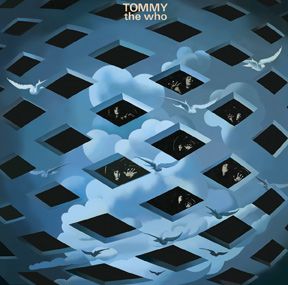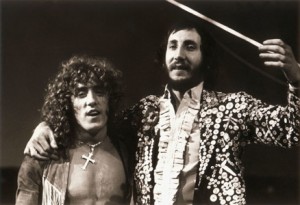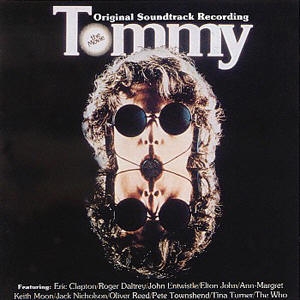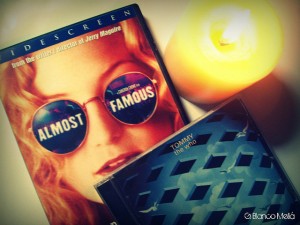Salutations,
In an effort to predispose myself towards a somewhat more consistent writing schedule, you may now look forward to my bi-monthly feature, a new column that will be taking a quick, dirty look at a landmark album or movie from the past on a rotating basis. This will be a somewhat more curtailed look than the in-depth analysis that myself and my colleagues at the Recorder have become known for over the past two months, but it will hopefully provide a quick listener’s (or viewer’s) guide to approaching the works of past masters. Owing to a lack of creativity and an overwhelming need to be a smart-ass on my part, this column will be henceforth entitled “The Grudge Report”.
For the record, this is not indicative of any sort of professional criticism on my part. The deep analysis you might expect, having already found it in many other articles within our magazine, will not be here. Nor, however, will this be a simple diatribe or a love totem on my part on the behalf of past masters. It’s best to think of this as simply a Buyer’s Guide to Classic Media, a Purchase or Pass if you will. Those looking for deeper analysis on my part may simply post below and let your feelings be heard.
You may enjoy.
Tommy – The Who (1969)
Ah, Tommy.
I have already made my feelings on The Who’s seminal double album known on this website, in response to a comment on the greatest double albums/rock operas of all time. I will state it again here for the masses (and the uninformed) that my official position is that Tommy is quite simply not a good piece of work. In fact, it’s downright silly.
Let’s start by examining the grandiose idea of the rock opera. Sure, a musician has a right to try and elevate his art beyond the simple pop songs of The Beatles, or even above the blues-infused rock of the Rolling Stones. It’s conceivable to even try and accelerate your musicianship above and beyond your (increasingly complex) songs that have made your name on the map.
Which is what Pete Townsend did. Following the success of songs such as “My Generation”, “I Can See for Miles”, and “Magic Bus”, he delved a little deeper into his musical abilities and wrote one of the first rock operas. Understand that this was the ‘60’s, a time of grand experimentation in music (some successful, some…not.) and the idea of expanding and burgeoning the self-conscious through music, love, and drugs was something that greatly appealed to the counter-culture. Townsend simply went one further, composing a double album on a massive scale that told a linear story, was replete with themes and motifs concerning self-identity and the immolation of the masses, and furthered the growth of rock ‘n roll from the pastime of Mods and Rockers into an art form that demanded serious respect and honest critical analysis.
He even got Roger Daltry to go along with it by making him the Hero of the Opera.
HOWEVER.
Let us examine the plot of Tommy, the resulting rock opera:
‘A young boy’s father goes off to fight in war. He is left behind with his mommy, who soon takes a lover and carries on an affair. When the father returns, he murders the lover in a jealous rage. Witnessing the trauma causes the boy to go deaf, dumb, and blind, when he is told by his parents that he didn’t see it, hear it, and won’t say anything about it. He consequently becomes an idol when it is discovered that he has a preternatural gift for playing the game of pinball. Becoming a messiah figure (a Pinball Wizard, if you will) he regains his senses, but his followers revolt when they learn that his enlightenment was only gained from being deaf, dumb, and blind, which quite frankly is a bit of a stinker. He regains their respect when a starship lands from outer space and it is revealed that the Great Electric Boogoloo in the Sky has been following him and that Tommy (the boy) is ready to return to the stars, where he can achieve his Ultimate Destiny as the Greatest Pinball Wizard of the Galaxy.’
Alright, I made that last part up. However, given the complete absurdity of Tommy’s plot, it’s not that far fetched to think that interstellar pinball might play a part. In all seriousness, the concept that Pete Townsend crammed into his magnum opus is so totally bonkers that one must wonder how he came up with it in the first place, let alone convince Keith Moon to go along with it.
I understand that the argument that “it was the ‘60’s, things were different back then” can be made. However, the ‘60’s also produced Sgt. Pepper, Andy Warhol, The Graduate, Midnight Cowboy, Beggars Banquet, the Grateful Dead, and countless other psychedelic works of art that, while inspired and certainly different, aren’t completely ludicrous when examined in their present day forms. Tommy reeks of an acid trip gone wrong.
The music, Townsend coming into his own, is certainly good. Just listen to “Sparks” sometime. There’s a great deal, musically, going on in there. However, musical highlights such as that are effectively rendered null and void when coupled with the absurd lyrics and storyline of the opera itself. (Did I mention the weird molesting uncle that comes in and torments Tommy for much of his youth? Yeah, unfortunately I didn’t make that part up.)
I can only imagine the conversation that happened:
“Pete Townsend: Mates, I’ve got something here that’ll totally blow you away.
John Entwistle: Oi, what’s it then?
Pete Townsend: It’s a rock opera!
(silence)
John: (Hesitently) Er, right. Well, what’s it all about then, Pete?
Pete: Here, read this! (hands out printed copies of the storyline to Tommy)
(deep silence)
John: Er, Pete, I’m not so sure about this then, mate.
Keith Moon: MOON SMASH! DRUM SMASH! (drums are smashed)
John: See? You’re giving Keith the fits again! What have we told you about that before?
Pete: No, no! It’ll be out there! It’ll be us against the Man again! Rog, what do you say?
Roger Daltry: (vamping in a mirror) I’m not doing it.
Pete: You can play the part of Tommy.
Roger: I’m doing it. Let’s do it.
Pete: And Keith, you can play the part of the molesting uncle!
Keith: …drum smash?
Pete: And you can drum smash.
Keith: DRUM SMASH! (drums are smashed)
John: And what’s in it for me, then?
Pete: Oh, you can continue to play bass in the band and for years be renowned as the best and most influential bassplayer in all of rock music while still somehow only playing fourth string even after our drummer drinks himself into a stupor, remaining unnoticed until your death in 30 plus years!
John: Oh. All right then.”
You get the idea.
As far as long-lasting music goes, the unfortunate reality is that much of Tommy is horribly unfriendly to radio play. This is not too surprising, considering that most of the songs deal with the absurd plot, awkward musical ascensions and declines, and that pedophilic uncle. The only song that stands as a bona fide classic rock radio staple is “Pinball Wizard”, which is admittedly a fantastic song. However, it’s still about a “deaf, dumb, and blind kid” who “sure plays a mean pinball.”
Following Tommy, which was a commercial success (“It was the ‘60’s! Things were different!”), Townsend began work on another rock opera called Lifehouse. This one would have been even grander, incorporating computers that would take a reading of everyone’s electronic signature before feeding it into an electronic synthesizer and making a musical combination of the piece. That the band would then play.
Instead of this actually happening, Townsend had a nervous breakdown. Shortly after that, the Who released (in this author’s opinion) their greatest work, Who’s Next (1971). Salvaging the scraps of Lifehouse, it features such radio staples as “Baba O’Riley”, “Behind Blue Eyes”, and “Won’t Get Fooled Again”, thus saving the CSI franchise from ever having to really look for an opening title song again. (It really is a solid album. There’s not a bad track on it, and the musical collaboration is the band at their strongest.)
Unfortunately, Tommy is still bat-shit insane.
When I first made my thoughts on Tommy known, I misspoke on my behalf. I claimed that Tommy should be wiped from the earth. I recant this, and admit my mistake. It took Tommy for Who’s Next to happen, and its influence allowed for a great deal of young progressive rockers to think to themselves: “Hmm, I could do something like that. Only saner.” Without it, classic rock would be less rich.
That being said…
I would like to finish by calling attention to the scene in Cameron Crowe’s Almost Famous (2000) where young William Miller is told that if he listens to Tommy with a candle burning, he will see his future. He does, and shortly thereafter becomes a young man with a passion and talent for rock journalism. It’s a nice myth, but unfortunately a falsehood in its entirety. Listening to Tommy with a candle burning will only give you a headache and bleary, smoke-filled eyes. Go on. Do yourself a favor.Save yourself two hours and go listen to Who’s Next.
Verdict: Buyer beware.










